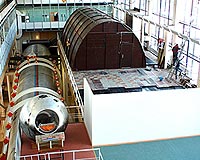 |
Lorraine, France (UPI) Nov 2, 2009 French scientists say the prolific virulence and growth of bacteria in space, coupled with reduced production of antibodies, might limit future space travel. The researchers from Nancy-University in Lorraine, France, said long-term space flights might compromised by microbial hitchhikers, such as bacteria. That's because space travel appears to weaken the human immune system, while increasing the virulence and growth of microbes, they said. "When people think of space travel, often the vast distances are what come to mind first," said Jean-Pol Frippiat, one of the report's co-authors. "But even after we figure out a way to cover these distances in a reasonable amount of time, we still need to figure out how astronauts are going to overcome disease and sickness." Frippiat and colleagues said they based their conclusions on studies showing that immune systems of both people and animals in space flight conditions are significantly weaker than their grounded counterparts. They also reviewed studies that examined the effects of space flight conditions and altered gravity on virulence and growth of common pathogens such as Salmonella, E.coli and Staphylococcus. Those studies, they said, show such bacteria reproduce more rapidly in space flight conditions, leading to increased risk of contamination, colonization and serious infection. The research appears in The Journal of Leukocyte Biology. Share This Article With Planet Earth
Related Links Space Medicine Technology and Systems
 Wanted: Guinea pigs with the Right Stuff
Wanted: Guinea pigs with the Right StuffParis (AFP) Oct 20, 2009 If being locked up in a cramped capsule for 17 months with five strangers is your idea of a good time, the European Space Agency (ESA) may have a job for you. ESA is looking for a few good men and women -- four, to be exact -- with the right qualities for an Earth-bound simulation of a Mars mission that may (or may not) happen a couple of decades from now. For candidates under 185 ... read more |
|
| The content herein, unless otherwise known to be public domain, are Copyright 1995-2009 - SpaceDaily. AFP and UPI Wire Stories are copyright Agence France-Presse and United Press International. ESA Portal Reports are copyright European Space Agency. All NASA sourced material is public domain. Additional copyrights may apply in whole or part to other bona fide parties. Advertising does not imply endorsement,agreement or approval of any opinions, statements or information provided by SpaceDaily on any Web page published or hosted by SpaceDaily. Privacy Statement |